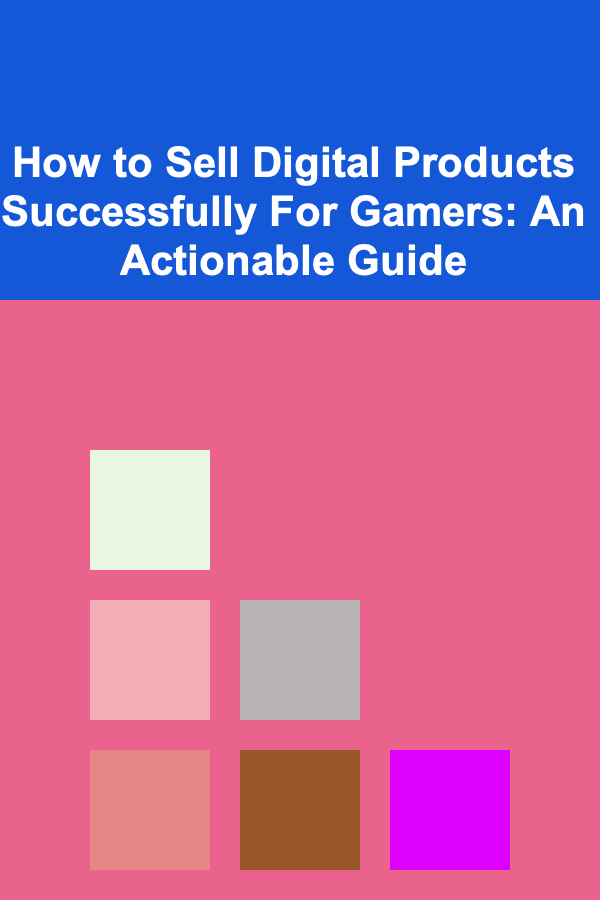
How to Sell Digital Products Successfully For Gamers: An Actionable Guide
ebook include PDF & Audio bundle (Micro Guide)
$12.99$7.99
Limited Time Offer! Order within the next:

The gaming industry has witnessed a massive transformation over the years. The rise of digital products such as downloadable content (DLC), game mods, in-game assets, and e-books has created a lucrative market for entrepreneurs looking to sell digital products to gamers. With a highly engaged, tech-savvy audience, gamers offer a promising customer base for digital goods, but the competition is fierce, and navigating this market requires a deep understanding of both gaming culture and digital commerce.
This guide will walk you through the steps to successfully sell digital products to gamers, covering everything from understanding your target audience to setting up your digital storefront, to marketing and scaling your sales.
Understanding the Gamer Market
Before you even start creating and selling digital products, it's crucial to understand the gaming market and the unique behaviors and preferences of gamers.
1.1 The Gamer Profile
Gamers aren't a monolith. There are many different types of gamers, each with unique interests and purchasing behaviors. These can include:
- Hardcore Gamers: Enthusiastic and dedicated players who often invest heavily in games, hardware, and digital content.
- Casual Gamers: Players who enjoy gaming but may not spend as much time or money on games. They are more likely to purchase smaller digital products like skins, soundtracks, or mobile game boosts.
- eSports Fans and Players: Competitive gamers who are interested in items that enhance their gameplay, such as training guides, strategy eBooks, or coaching services.
- Modders and Creators: Gamers who are heavily involved in customizing or creating new content for existing games, such as mods, maps, and textures.
Understanding who you're targeting will help you shape your product offerings and marketing strategies.
1.2 Digital Product Demand in Gaming
Digital products in the gaming industry range from game mods to in-game purchases and even entirely digital games. Some popular categories of digital products include:
- In-Game Content: Skins, characters, avatars, weapons, maps, and cosmetics. These products can enhance the gaming experience and are highly popular in multiplayer games.
- Game Mods: Modifications or customizations made to games by the player community. Mods can include new levels, character models, or game mechanics that improve or change the original experience.
- Gaming E-books and Guides: Strategy guides, walkthroughs, or lore-rich novels that expand on the game's story or help players succeed.
- Soundtracks: Official soundtracks from popular games, often with special tracks or arrangements that fans want to own.
- Software Tools and Utilities: Tools that help improve gameplay, enhance graphics, or optimize system performance for gaming.
1.3 Understanding Gamer Purchasing Behavior
Gamers are generally enthusiastic buyers but require good value and an engaging experience. In-game purchases, DLCs, and expansions are common but must be marketed appropriately to show the benefit of the item. Gamers also tend to value:
- Value for Money: Gamers tend to research a product before purchasing, comparing prices and seeking recommendations from trusted sources. Offering competitive prices, bundles, or sales can be a great incentive.
- Exclusivity: Limited edition digital items, special bonuses, or content only available through specific platforms can create urgency and appeal.
- Community Engagement: Gamers are often part of gaming communities. Creating a product that resonates with their community can create loyal customers who feel more connected to your brand.
Creating the Right Digital Product
Creating the right digital product for gamers starts with identifying a niche, understanding what gamers need, and providing a high-quality product that meets those needs.
2.1 Identify the Right Niche
Find a gap in the market or a particular need within the gaming community that isn't being met adequately. For instance:
- Game Mods: If you're skilled in game development or graphic design, you can create mods for popular games. For example, creating custom skins, game levels, or unique assets that improve or alter gameplay.
- Strategy Guides: Hardcore players often want in-depth guides, walkthroughs, or tips for difficult parts of a game. This could be a digital e-book or a video series.
- Gaming Assets: These can include character models, textures, maps, and other game content that indie developers or hobbyists can purchase to use in their games.
2.2 Create a High-Quality Product
Once you've identified your niche, ensure that your product stands out in terms of quality. Whether you're designing digital art, writing guides, or building mods, your product should:
- Offer Value: Make sure your product improves or enhances the gamer's experience.
- Be Polished: Poor quality or buggy digital products won't attract customers. Ensure that your product works as promised, with no glitches or issues.
- Be Easy to Use: Whether it's a mod or a guide, ensure that it is user-friendly and doesn't require complicated installations or instructions.
2.3 Price Your Product
Pricing is crucial in the gaming market. Digital products must be priced competitively to attract gamers but should also reflect the value they offer. Consider these strategies:
- Competitive Pricing: Research similar products in the market to see what price points work for products like yours.
- Tiered Pricing: Offer different versions of your product, such as a basic version at a lower price and an extended version with additional features at a higher price.
- Discounts and Promotions: Gamers love sales events, so consider offering time-limited discounts, seasonal sales, or bundle offers.
Building a Digital Storefront
Once you have your product ready, you need a platform where gamers can easily find and purchase it. Your online storefront should be optimized for digital goods.
3.1 Choosing the Right Platform
There are several platforms where you can sell digital products to gamers, each with its pros and cons:
- Your Own Website: Having your own eCommerce website gives you full control over your branding and customer relationships. Use platforms like Shopify, WooCommerce, or BigCommerce to set up a store.
- Marketplaces : Platforms like Steam, GOG, or itch.io allow you to sell your digital products within a large established community of gamers. These platforms provide instant visibility, but they often charge commissions.
- Game-Specific Platforms: If your digital product is tied to a specific game (e.g., mods or custom skins), consider selling through platforms that support those communities, such as the Steam Workshop or Nexus Mods.
3.2 Creating an Engaging Product Page
An engaging product page helps sell your product. Here are some key components:
- Clear Product Descriptions: Provide a clear, detailed description of what the product is and how it benefits the gamer.
- Screenshots and Previews: Show what the product looks like in action. Screenshots, preview videos, or demos can help potential buyers understand what they're purchasing.
- Customer Reviews and Testimonials: Positive reviews and testimonials from other gamers can help build credibility and trust.
- Call to Action: Have a strong call to action, such as "Buy Now," to guide customers to make a purchase.
3.3 Payment and Delivery
Ensure your payment system is smooth and secure. Popular payment methods for digital products include:
- PayPal: A widely trusted and easy-to-integrate option.
- Credit Cards: Support for all major credit cards is a must.
- Digital Wallets: Consider integrating digital wallets like Google Pay, Apple Pay, or cryptocurrency if your customer base demands it.
Once a customer completes a purchase, ensure that the digital product is delivered automatically, either by email or through a direct download link on your site.
Marketing Your Digital Products to Gamers
Marketing is key to your success in selling digital products. Without an audience, even the best product won't sell.
4.1 Build a Community
Building a community around your digital product is one of the most effective ways to generate sales. Gamers love to feel like they are part of something larger than themselves, whether it's through social media, gaming forums, or Discord channels.
- Social Media: Platforms like Twitter, Instagram, and TikTok are ideal for showcasing game-related content, previews, and behind-the-scenes updates.
- Discord Communities: Set up a Discord server where players can connect, discuss, and give feedback about your product. This also allows you to offer customer support and maintain engagement.
- Forums and Subreddits: Participate in relevant gaming communities like Reddit's gaming subreddits or specialized forums to promote your product.
4.2 Content Marketing
Content marketing is a powerful tool in the gaming industry. Create content that resonates with your audience:
- Tutorials and Guides: Post valuable content that educates your audience about how to use your product or offers helpful gaming tips.
- Streaming and YouTube: Stream your product in action on platforms like Twitch or YouTube. Gamers trust influencers and streamers to recommend products they like.
- Influencer Marketing: Partner with popular gamers or streamers who can endorse or showcase your product to their followers.
4.3 Paid Advertising
If you have the budget, consider using paid advertising to reach a wider audience:
- Facebook and Instagram Ads: These platforms allow for targeted ads that can be shown to users based on their interests, including gaming.
- Google Ads: Run search or display ads that target gamers searching for digital products related to your niche.
- Twitch Ads: For game-related products, advertising directly on gaming platforms like Twitch can help you reach a highly engaged audience.
Scaling Your Digital Product Business
Once you start gaining traction, you can focus on scaling your digital product business to maximize your success.
5.1 Expand Your Product Line
Consider expanding your product offerings. If you're selling mods for one game, consider creating products for other popular games in your niche. Diversifying your portfolio can increase your overall revenue.
5.2 Partner with Other Creators
Collaborating with other game developers or content creators can help you reach new audiences and cross-promote your products. Joint promotions, bundles, or co-created content can open up new opportunities.
5.3 Analyze and Optimize
Regularly review your sales data to identify trends, customer preferences, and areas for improvement. A/B testing product descriptions, pricing, or promotional strategies can help you optimize your sales performance.
Conclusion
Selling digital products to gamers can be a highly rewarding venture, but it requires a clear understanding of your target market, high-quality products, and effective marketing strategies. By understanding what gamers want, building a strong online presence, and engaging with the gaming community, you can carve out a successful business selling digital products in the gaming industry.

How to Decorate Your Home for the Holidays Without Overcrowding
Read More
How to Make a Meal Planning Checklist for Busy Families
Read More
How to Plan for Seasonal Maintenance Tasks
Read More
How to Share Stories and Wisdom Through Oral Histories
Read More
How to Use Real Estate to Hedge Against Inflation
Read More
The Art of Insurance Underwriting: Building Stronger Business Relationships Through Data Analysis
Read MoreOther Products

How to Decorate Your Home for the Holidays Without Overcrowding
Read More
How to Make a Meal Planning Checklist for Busy Families
Read More
How to Plan for Seasonal Maintenance Tasks
Read More
How to Share Stories and Wisdom Through Oral Histories
Read More
How to Use Real Estate to Hedge Against Inflation
Read More